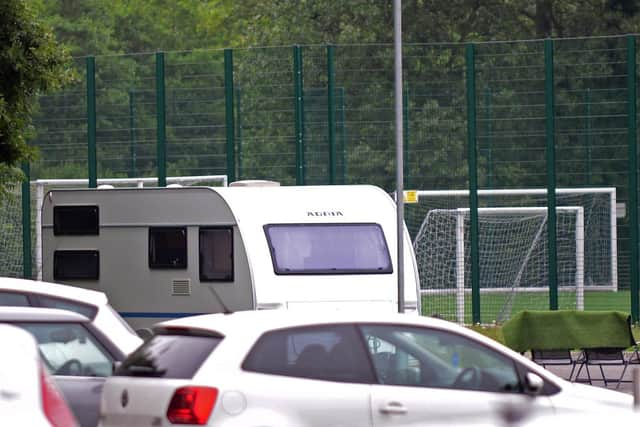This is what you can do if travellers illegally camp on your land or in your area
and live on Freeview channel 276
There are currently four caravans on site at the supermarket in Handsworth and around 12 more families on a football pitch at Catcliffe Recreation Ground, Rotherham.
It is understood that South Yorkshire Police has been contacted about the Catcliffe site and that the travellers have been asked to leave today.
Advertisement
Hide AdAdvertisement
Hide AdLast month around two dozen traveller families set up camp on the same site in the village.


They broke into changing rooms and toilets on the site during their week-long stay.
A clean-up operation was mounted after they left when human excrement and rubbish was found strewn around the recreation ground.
Rubbish, bags of waste and a discarded tyre, chair, gas bottle and pet carrier were among items left behind.
Advertisement
Hide AdAdvertisement
Hide AdHere is everything you need to know about the rights of travellers and how previous illegal camps have been dealt with.
Where can travellers park?
Travellers are not allowed to park anywhere they do not have permission, including private land and land owned by the council.
It is an offence to park on a road or verge or in a layby in a way that obstructs or could be a danger to other users of the road, on cultivated land such as farm land and in enclosed plantations such as land owned by the Forestry Commission.
The law
A new law has been proposed under the Police, Crime, Sentencing and Courts Bill: Part 4 which would ban illegal traveller camps on private land in the country.
Advertisement
Hide AdAdvertisement
Hide AdThose who breach the rules will face a three-month prison sentence, a £2,500 fine, or both.
The law, first introduced in February, will enable police to seize vehicles and arrest those who refuse to move on at the landowner’s request.
Before the reform was created, trespass was a civil offence rather than a criminal one, forcing landowners to fight long battles in court.
It was introduced in a bid to crack down on problems with noise and litter which are often associated with illegal camps on private land.
The council
Advertisement
Hide AdAdvertisement
Hide AdIf travellers are parked on council land, a local authority representative will have to visit the site to assess the situation.
From this assessment they will decide if they need to be moved on or not, and will look at the safety and wellbeing concerns faced – for example if anyone is pregnant or ill, or if there are any dangerous conditions nearby.
They will also look at what the land is usually used for and how soon it will be required, as well as whether it is big enough to house the number of vehicles on the site.
You should contact your local council and alert them if you spot a site on their land, so an officer can attend and assess the wellbeing of those involved and the wider community.
Advertisement
Hide AdAdvertisement
Hide AdIf the council decides that the travellers should be moved on, they will have to apply for injunctions and court orders and prove that they are on the site without permission.
An eviction date will then be decided once a court date has been set - but usually there is chance for the council and travellers to agree a leaving date between them to prevent this.
The police
The council or landowner can contact the police if travellers are trespassing on the site and they can be immediately evicted if there are two or more people, they have six or more vehicles parked on the land or one of them has caused damage or behaved in a threatening or abusive manner.
The police will ask them to move on as soon as they can, but they must be given time to pack up their belongings.
Advertisement
Hide AdAdvertisement
Hide AdIt becomes a criminal offence if they fail to move on in the time given or return within three months, meaning they could face a fine or prison sentence.
Police also have the right to tow away vehicles, which will then be destroyed if not claimed within 21 days.
What to do if travellers have set up camp on your land
If a site has been set up on your own private land then you can apply to have the occupiers removed if they are causing a nuisance but you should assess whether the situation will have an impact on you first.
It’s a good idea to talk to them first to see if a leaving date can be agreed, but if not, you can take proceedings to the County Court under the Civil Procedure Rules, 1998.
Advertisement
Hide AdAdvertisement
Hide AdThere must be a minimum of two clear days between service of documents and the court hearing.
Your solicitor should be able to help you with this and explain the costs involved.
Short term camps are considered okay, so if you are happy for the travellers to stay on your land for a short period of time then this is fine, but longer stays require planning permission.
What has happened at illegal camps in the past
Earlier in the year, a number of travellers set up camp at a field opposite Goals football centre on Norfolk Park Road in Sheffield.
Advertisement
Hide AdAdvertisement
Hide AdBoth the police and council were contacted about this, but after council officials visited the site, the occupiers agreed to move on and no further action was required.
Travellers who set up a site on a car park in High Green in 2019 were threatened with legal action if they refused to move on by the date they were given by the council.
